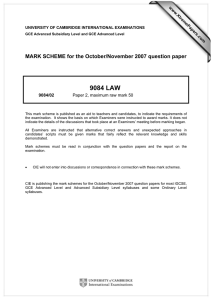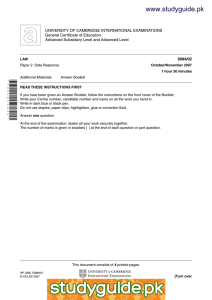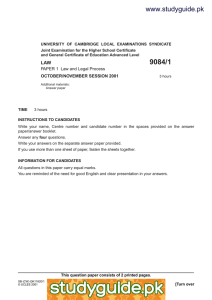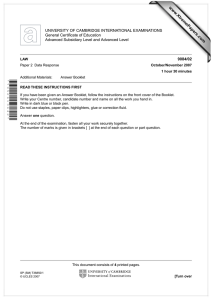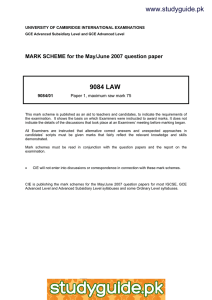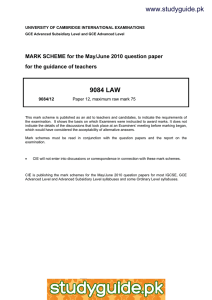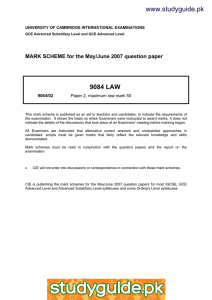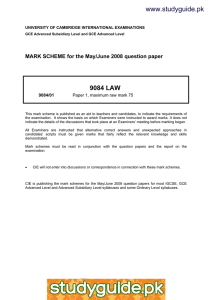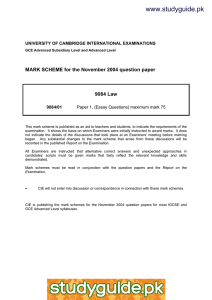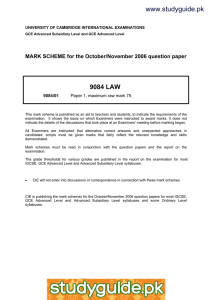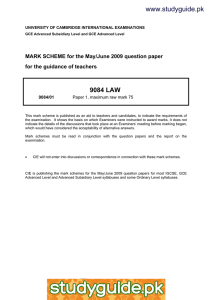www.studyguide.pk 9084 LAW
advertisement
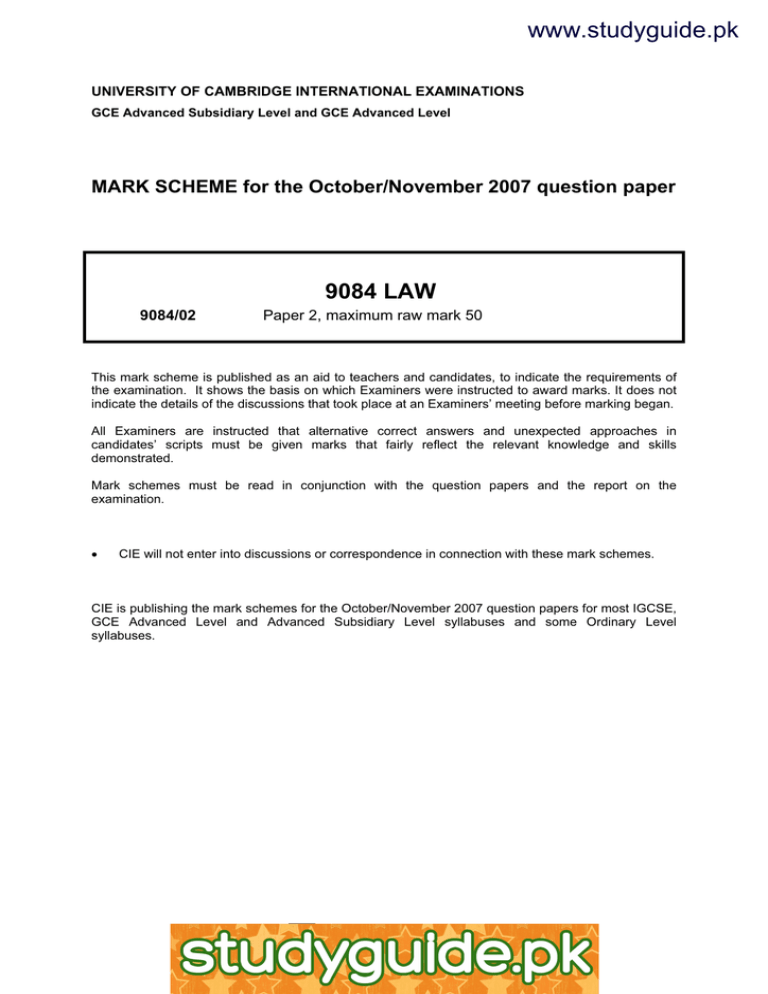
www.studyguide.pk UNIVERSITY OF CAMBRIDGE INTERNATIONAL EXAMINATIONS GCE Advanced Subsidiary Level and GCE Advanced Level MARK SCHEME for the October/November 2007 question paper 9084 LAW 9084/02 Paper 2, maximum raw mark 50 This mark scheme is published as an aid to teachers and candidates, to indicate the requirements of the examination. It shows the basis on which Examiners were instructed to award marks. It does not indicate the details of the discussions that took place at an Examiners’ meeting before marking began. All Examiners are instructed that alternative correct answers and unexpected approaches in candidates’ scripts must be given marks that fairly reflect the relevant knowledge and skills demonstrated. Mark schemes must be read in conjunction with the question papers and the report on the examination. • CIE will not enter into discussions or correspondence in connection with these mark schemes. CIE is publishing the mark schemes for the October/November 2007 question papers for most IGCSE, GCE Advanced Level and Advanced Subsidiary Level syllabuses and some Ordinary Level syllabuses. www.xtremepapers.net www.studyguide.pk Page 2 1 Mark Scheme GCE A/AS LEVEL – October/November 2007 Syllabus 9084 Paper 02 (a) The police are called to the scene of a burglary at Fawlty Towers. As they arrive they see Basil Biggs running away and they arrest him on suspicion of burglary and take him by car to the police station. On the way DC Sharp asks Biggs what he has done with the stolen property. Biggs replies ‘...You’ll never find it. I threw it down a drain.’ Consider the following sources and explain whether this evidence can be used in court against Basil Biggs. [10] This question focuses on the provisions of PACE and the relevant codes of practice. The relevant section here is s.78 which, considers the exclusion of unfair evidence and also code 11.1. Taken together the evidence of the conversation in the car may be excluded as it is unfairly obtained. This depends on construction of the two sources and should be generously marked where candidates identify the issues and the relevant sources. MAX 5 for no specific reference to sources. MAX 8 for candidates who refer to section obliquely but not specifically. (b) They arrive at the police station at 2.15pm. At 2.30pm, Biggs is seen by the custody officer, who orders him to be held for questioning. Biggs asks to consult a solicitor but is told that his request will not be permitted at present, as a DC wants to interview him immediately. Discuss whether the treatment given to Biggs at the police station complies with the requirements of the present law. [10] The relevant source here is s.58, which covers access to legal advice. Candidates may be aware of other relevant material including reference to Code C and availability of information concerning legal advice. MAX 8 candidates who refer to section obliquely but not specifically. MAX 6 for overall good discussion but wrong conclusion (c) Biggs is interviewed under caution. He denies the offence until the Detective Constable tells him that, if he confesses to the burglary, the custody officer will give him bail. Biggs then admits the offence and says that he gave the jewellery to friend. Discuss whether evidence of his confession can be used at his trial. [10] The candidate here must consider the admissibility of the confession under s.76. The source material is given in considerable detail here so the candidate would be expected to apply the section in detail in particular whether the offering of bail would be considered to be oppressive. MAX 8 for oblique reference to source material. (d) To what extent do you think that the Police and Criminal Evidence Act 1984 protects the rights of those detained and kept in custody? [20] The candidate will need to understand PACE in detail. They may choose to focus on one section such as stop and search; and credit should be given to a comment such as there is evidence that the police use these powers discriminately so some members of the population are stopped and searched far more than others e.g. ethnic minorities. They may consider the more extensive powers of the police in relation to serious arrestable offences which are treated differently. Any sensible comment supported by the PACE should be credited generously. MAX 10 for discussion based only on source material and for no inclusion of original material. A good candidate who adds details of other relevant legislation which protects the rights of detainees can be credited where included sensibly. © UCLES 2007 www.xtremepapers.net www.studyguide.pk Page 3 Mark Scheme GCE A/AS LEVEL – October/November 2007 Syllabus 9084 Paper 02 SOURCES Police and Criminal Evidence Act 1984 s.58 Access to Legal Advice (1) A person arrested and held in custody in a police station or other premises shall be entitled, if he so requests, to consult a solicitor privately at any time. (4) If a person makes such a request, he must be permitted to consult a solicitor as soon as is practicable except to the extent that delay is permitted by this section. s.76 Confessions (1) In any proceedings a confession made by an accused person may be given in evidence against him in so far as it is relevant to any matter in issue in the proceedings and is not excluded by the court in pursuance of this section. (2) If, in any proceedings where the prosecution proposes to give in evidence a confession made by an accused person, it is represented to the court that the confession was or may have been obtained(a) by oppression of the person who made it; or (b) in consequence of anything said or done which was likely, in the circumstances existing at the time, to render unreliable any confession which might be made by him in consequence thereof, The court shall not allow the confession to be given in evidence against him except in so far as the prosecution proves to the court beyond reasonable doubt that the confession (notwithstanding that it may be true) was not obtained as aforesaid. s.78 (1) Exclusion of unfair evidence In any proceedings the court may refuse to allow evidence on which the prosecution proposes to rely to be given if it appears to the court that having regard to all the circumstances including the circumstances in which the evidence was obtained the admission of the evidence would have such an adverse effect on the fairness of the proceedings that the court ought not to admit it... Code C 11.1 Following a decision to arrest a suspect they must not be interviewed about the relevant offence except at a police station or other authorised place of detention unless the consequent delay would be likely to lead to interference with or harm to evidence connected with an offence. © UCLES 2007 www.xtremepapers.net www.studyguide.pk Page 4 2 Mark Scheme GCE A/AS LEVEL – October/November 2007 Syllabus 9084 Paper 02 (a) Mustafa decided to install double-glazing at his house and he chose a local firm ‘Beta Windows’ to install it. The price for the work, including the windows and other materials and the cost of fitting, was agreed at £5,000. The work was completed on time and Mustafa was satisfied with it. A few weeks later he noticed that the frames of the window had begun to rot and there were now some gaps between the window frames and the walls of the house. Consider whether Mustafa has a claim against ‘Beta Windows’. [10] The facts are based on the Supply of Goods and Services Act 1982. The facts suggest that several sections of the 1982 Act will apply. Ss12 and 13 will apply to the fitting of the windows and ss.4 (2),(2A) and (4) and (5) should all be considered as they are all potentially relevant. Clearly windows supplied are not of reasonable quality. Good answers in the top band must apply the relevant sections and come to a conclusion. General references to the source material will only reach the middle bands. Candidates who fail to mention the source material at all will remain in the lower bands, marks will only be awarded where they identify the nature of the problem. MAX 8 for reference to source material without application. MAX 7 for reference to only one part of the statute. Source material relevant to [a] but cited in other sections may be credited where sufficient connection with statutory authority of [a] is made. (b) If Mustafa decides to sue ‘Beta Windows’ in which court will the action be heard? Explain, giving reasons, whether it will be allocated to a ‘fast track hearing’? [10] This section requires consideration of the civil court system. The appropriate court here will be the small claims procedure in the county court in view of the amount claimed but if the facts warrant it this may be tried under the fast track procedure in the county court. MAX 8 for only looking at one venue. MAX 5 for general discussion about county court as appropriate venue. (c) Given the provisions of section 4 (5) of the Supply of Goods and Services Act 1982, what claim would Mustafa have against ‘Beta Windows’ if he used the windows for a different purpose? [10] This part of the question focuses on s.4(5) SGSA 1982. This suggests that even a different use by the purchaser may leave the supplier liable for defective goods. MAX 4 for merely writing out the section. MAX 6 for reference to statute and basic discussion. For MAX 10 there must be some general discussion. (d) Discuss the merits of the current process for hearing cases in the civil system of justice. [20] A good answer to this part will explain the problems in the civil system of justice. These were identified by Woolf, as excessive and unpredictable as well as cost, delay and complexity. The proceedings were too adversarial. Key features of the reforms: unified set of civil procedure rules; claimant offers to settle and the use of single joint experts; allocation of cases to small claims, fast track or multi-track according to their value and complexity. Better candidates may also identify the encouragement given to the parties in the use of alternative dispute resolution. Mention may also be made of case management and its benefits and its link with alternative dispute resolution. Credit for general discussion of adjudication of civil disputes in courts. e.g. Use of precedent or the merits of adjudication by the judiciary. © UCLES 2007 www.xtremepapers.net www.studyguide.pk Page 5 Mark Scheme GCE A/AS LEVEL – October/November 2007 Syllabus 9084 Paper 02 SOURCES Supply of Goods and Services Act 1982 s.4 Implied Terms about quality and fitness (2) Where, under such a contract, the transferor transfers the property in goods in the course of a business, there is an implied condition that the goods supplied under the contract are of satisfactory quality, (2A) For the purpose of this section and section 5 below goods are of satisfactory quality if they meet the standard that a reasonable person would regard as satisfactory, taking into account of any description of the goods, the price (if relevant) and all the other relevant circumstances, (4) Subsection 5 below applies where under a contract for the transfer of goods the transferor transfers the property in goods in the course of business and the transferee, expressly or by implication makes known – (a) to the transferor, any particular purpose for which the goods are being acquired (5) In that case there is (subject to subsection (6) below) an implied condition that the goods supplied under the contract are reasonably fit for the purposes, whether or not that is a purpose for which such goods are commonly supplied. s.12 (1) In this Act a ‘contract for the supply of a service’ means, subject to subsection (2) below, a contract under which a person (‘the supplier’ agrees to carry out a service. s.13 Implied term about care and skill In a contract for the supply of a service where the supplier is acting in the course of a business, there is an implied term that the supplier will carry out the service with reasonable care and skill. © UCLES 2007 www.xtremepapers.net
